Health Care Power of Attorney and Related Documents for Montanans
EB0231
Revised August 2025
The Legal and Financial Committee of the Montana Alzheimer’s/Dementia Workgroup; Health Care Law Section and Business, Estates, Trusts, Tax & Real Property Section, State Bar of Montana; Montana Generational Justice; Marsha A. Goetting, Ph.D., CFP®, CFCS, Professor and Extension Family Economics Specialist, Montana State University Bozeman
Disclaimer
This publication is not a substitute for legal or medical advice. Rather, it is to help families become aware of Health Care Powers of Attorney for Montanans and related health care decisions. Future changes in laws are not predictable. Statements in this document reflect laws in force on the date of publication.
Health Care Power of Attorney
END-OF-LIFE AND HEALTH CARE DECISIONS ARE PERSONAL. They are based upon our family and life experiences, spiritual and religious beliefs, and knowledge gained throughout life. You may have shared feelings about medical and end-of-life issues with your health care providers, family and friends. However, when it comes to the legalities surrounding formal decision-making, talking simply isn’t enough. If you should become incapacitated or have difficulty communicating when a decision needs to be made, your health care wishes need to be in writing. Written legal documents will ensure your wishes are followed by those making decisions with and for you.
One challenge often encountered is the difference in terminology used by the legal profession and health care providers. Many of us have heard about or seen different forms on the Web, in hospitals or physicians’offices. Some documents are the latest versions, while others may not be recognized by health care providers. The documents may also not adequately communicate your wishes.
To address these concerns, several organizations have collaborated to develop a model Health Care Power of Attorney (Form A) for Montanans. They have also created two optional forms (Form B and Form C) along with a worksheet. These forms should be used to appoint health care agent(s) and assist others in understanding your health care preferences.
This publication specifically explains a Health Care Power of Attorney for Montanans. For information about a financial power of attorney, see the MSU Extension MontGuide “Power of Attorney (Financial)” (MT199001HR) available from your local MSU Extension office.
Forms
Worksheet. The purpose of the worksheet is to provide questions that, when answered, help you, your agent, family, health care providers, and others who are involved, to make decisions about your health care. You may want to complete the worksheet before designating a health care agent or before making end of life decisions
Form A. This form is a model Health Care Power of Attorney. The form provides a formal, legal way to appoint your health care agent(s) to assist you and make health care decisions for you. The form also provides information to your agent(s) about your health care and end-of-life wishes.
Forms B and C. Montanans who want to provide additional directions to their families about specific health care treatments and related decisions will want to complete these forms.
Forms B and C are optional. If you do not fill them out, your agent still has authority to make treatment decisions based on your Health Care Power of Attorney.
Instructions for Form A
1. Appointment of an Agent
Identify yourself and your agent. Appointing an agent to act as your health care power of attorney is an important decision. If you want your spouse to be your agent, identify him/her in this section. Write your spouse’s full legal name, not a nickname. Do not use social titles, for example, my wife, my husband, or my spouse.
2. Appointment of Back-up Agent(s)
Identify your back-up agents. In case your agent is unable to perform his/her duties, naming a back-up agent is a good idea. As an example, your agent could become ill or be traveling outside the United States when you need him/her to make a health-related decision. If you want an adult child or a close friend to be a back-up agent, list the name of each person in order of priority.
You may cancel (revoke) the authority of your agent or back-up agent at any time. You may revoke your health care power of attorney either in writing, signed by you or by a verbal statement in the presence of a person relying on the revocation, such as telling your physician or nurse, “I revoke my health care power of attorney.”
Your revocation is effective after individuals who rely on your Health Care Power of Attorney see your revocation in writing or hear you revoke your power of attorney. After you revoke your Health Care Power of Attorney, your agent will no longer have authority to make health care decisions for you.
3. Agent's Authority and Obligations
Describe your agent’s authority. Your agent should make decisions about your health care based on your wishes and best interests. Once your agent’s authority is effective, he/she can act on your behalf about any health matters you have listed. Your agent can receive and disclose information about your health condition to others. Your agent can talk with your physician and other health care providers, as well as staff in insurance, billing, and medical records on your behalf.
A Health Care Power of Attorney gives your agent authorization to act for you under the state and federal law, including the Health Insurance Portability and Accountability Act, commonly called HIPAA.
4. When an Agent's Authority Becomes Effective
Decide when your agent’s authority to take actions for you becomes effective. You have two options. On Form A choose ONLY Option A or Option B.
CHOOSING OPTION A
Option A makes your agent’s authority effective as soon as you sign the document.
- Allows your agent to take actions for you immediately, without having to prove you are incapable of making your own health care decisions.
- Allows your agent to have the authority to help you, even while you are able to make your own health care decisions. You always keep the ability to make your own health care decisions, for as long as you want and are able.
- Means your agent will not have to ask a physician, other health care provider, or person designated by you whether you are incapable of making health care decisions before the appointment becomes effective.
- Makes it clear to health care providers and insurance company personnel your agent has authority to take actions, even if the health care provider or insurance company does not know whether you are able to make your own health decisions.
- Allows personnel from an insurance company or a billing or medical records office or your health care provider to speak with your agent (including over the telephone), without knowing if you are able to make your own health care decisions.
- Allows your agent to receive information about your health care when you want help
scheduling appointments, doing what the physician asks you to
do, moving between physicians, understanding and paying medical bills, getting medications, and other similar matters.
CHOOSING OPTION B
Option B makes your agent’s authority effective only when you are not able to make health care decisions for yourself.
Your primary care or attending physician, advanced practice registered nurse or other person designated by you is the one to determine whether you are capable of making health care decisions for yourself.
Until such a determination is made, health care providers and health plans will be prohibited by state and federal laws, including HIPAA, from disclosing health care information about you to your designated agent (except in limited circumstances), unless you sign a separate written authorization for the agent.
Do not choose Option B if you want your agent’s authority to be effective during periods when it is unclear whether you are capable of making your own health care decisions. Such situations may include being under the influence of strong medications, when you are experiencing pain or stress, or when dementia or a mental illness worsens.
5. Guidance and Preferences
Provide additional directions to your agent. Express guidance and your preferences about specific matters of health care treatments and other decisions not covered on Forms A, B, or C.
6. Nomination of Legal Gaurdian
Nominate your chosen agent or a back-up agent as your legal guardian. Nominating a guardian is important if it becomes necessary for the district court to appoint a legal guardian for you. Your guardian makes additional decisions for you such as living arrangements. Your nominated guardian has priority over other persons for appointment by the district court as your guardian.
7. Determination of My Capacity to Make Decisions
Indicate who has authority to determine your ability to make your own decisions. This section allows you to designate one or more persons to determine whether you are capable of making your own health care decisions. You may grant such authority to your primary care physician, attending physician or advanced practice registered nurse. If you prefer to grant “capability” authority to your spouse, adult, child, or other trusted person, ask an attorney to explain the pros and cons of allowing a person without medical training to make the determination.
8. Administrative Provisions
Enforcement of your Health Care Power of Attorney. This section covers miscellaneous issues such as the validity of the form in other states, compensation for services for your agent(s), and how to revoke a Health Care Power of Attorney you signed previously.
9. Instructions for Forms B and C
Optional Forms B and C provide additional information that could be relevant to you and your family members.
On Form B, you indicate the termination or continuation of life-sustaining treatment which is your right under the Montana Rights of the Terminally Ill Act. For additional information about this Act, see MSU Extension MontGuide “Living Wills (Declarations in MT)” (MT199202HR).
Form C allows you to provide additional instructions about religious preference and preferred place of death. You may provide how you want your body disposed of (e.g. burial, cremation) under the Montana Rights of Disposition Act. For information about this Act, see MSU Extension MontGuide “What Are Your Rights Over Your Remains?” (MT200918HR).
10. Signature and Notary
Sign your Health Care Power of Attorney. In Montana, a Health Care Power of Attorney is effective upon your signature, without having your signature notarized or witnessed. However, notarization provides proof your signature is genuine should any questions arise from family members and/or health care professionals. For this reason, a notary section is included on Form A.
Unique Situations
Although the worksheet and Forms A, B, and C are designed to apply to all Montanans, everyone’s health situation is different. Ask an attorney to provide further clarification about information in the worksheet and forms. An attorney could customize a Health Care Power of Attorney and related documents for your specific situation. You, your health care providers and your attorney should review these documents when there is a change in your health condition or life circumstance such as a divorce.
Who Should Have a Copy of Your Health Care Documents
You should give copies of your health care documents to the following:
- Appropriate family members;
- Your health care agent;
- Your physician and other health care providers;
- Your local hospital; and
- Your attorney
You may also want to store your health care documents with the Montana End-of-life Registry.
The registry is a place where advance directives are electronically stored. Registered health care providers can access them 24 hours a day. You and your family members can also access your documents with a code you provide. The Montana Attorney General’s Office oversees registry filings, security and operations.
Because of the difficulty of accessing documents when needed, a safe deposit box is
NOT a wise place to store Health Care Power of Attorney and
related documents.
For additional information, see the MSU Extension MontGuide “Montana End-of-life Registry” (MT200602HR); and “Living Wills (Declarations in MT)” (MT199202HR).
Acknowledgement
Members of the following Montana organizations have reviewed the worksheet and Forms A, B, and C:
- Health Care Law Section, State Bar of Montana;
- Business, Estates, Trusts, Tax, and Real Property Section, State Bar of Montana;
- Montana Alzheimer’s Workgroup, Legal and Financial Committee; and
- Montana Generational Justice.
Appreciation is also expressed to Montana citizens who piloted the forms and provided helpful suggestions.
Disclaimer
This publication is not a substitute for legal or medical advice. Rather, it is to help families become aware of Health Care Powers of Attorney for Montanans and related health care decisions. Future changes in laws are not predictable. Statements in this document reflect laws in force on the date of publication.
End of Life Worksheet
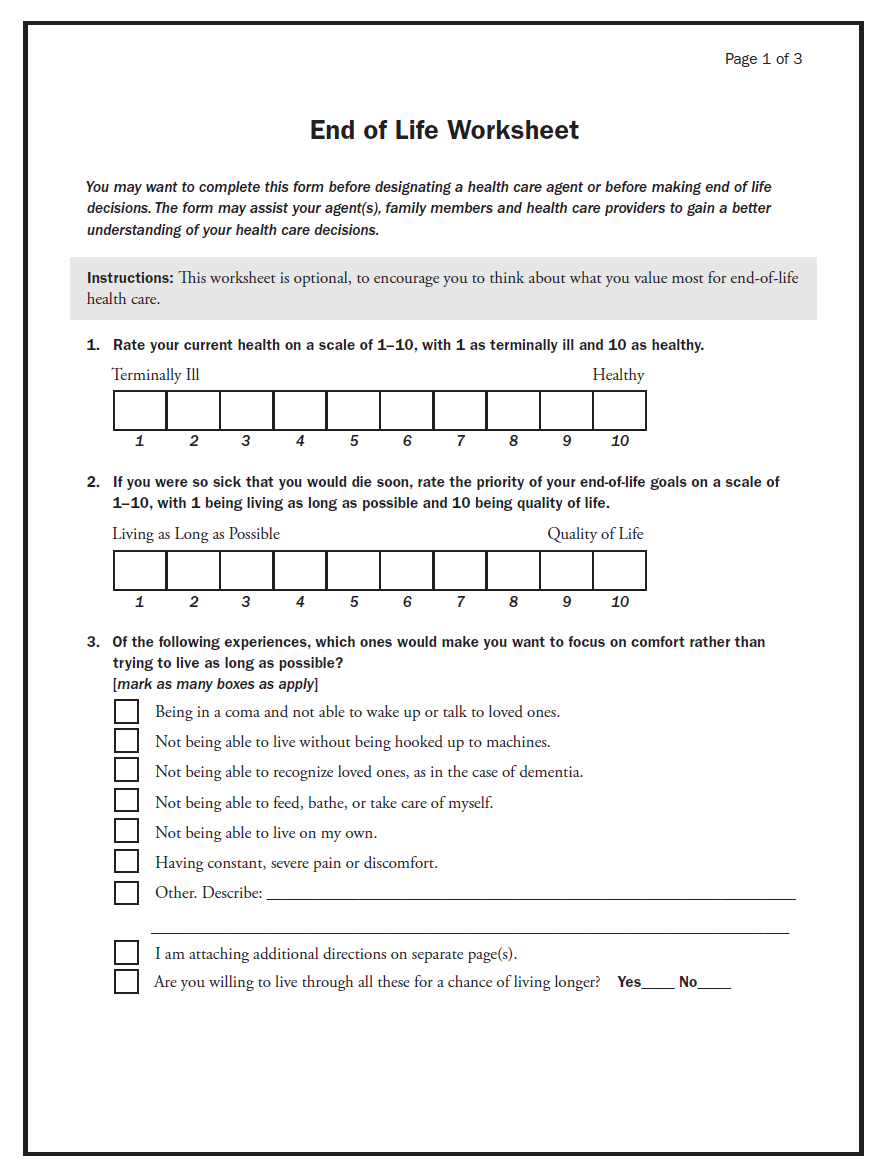
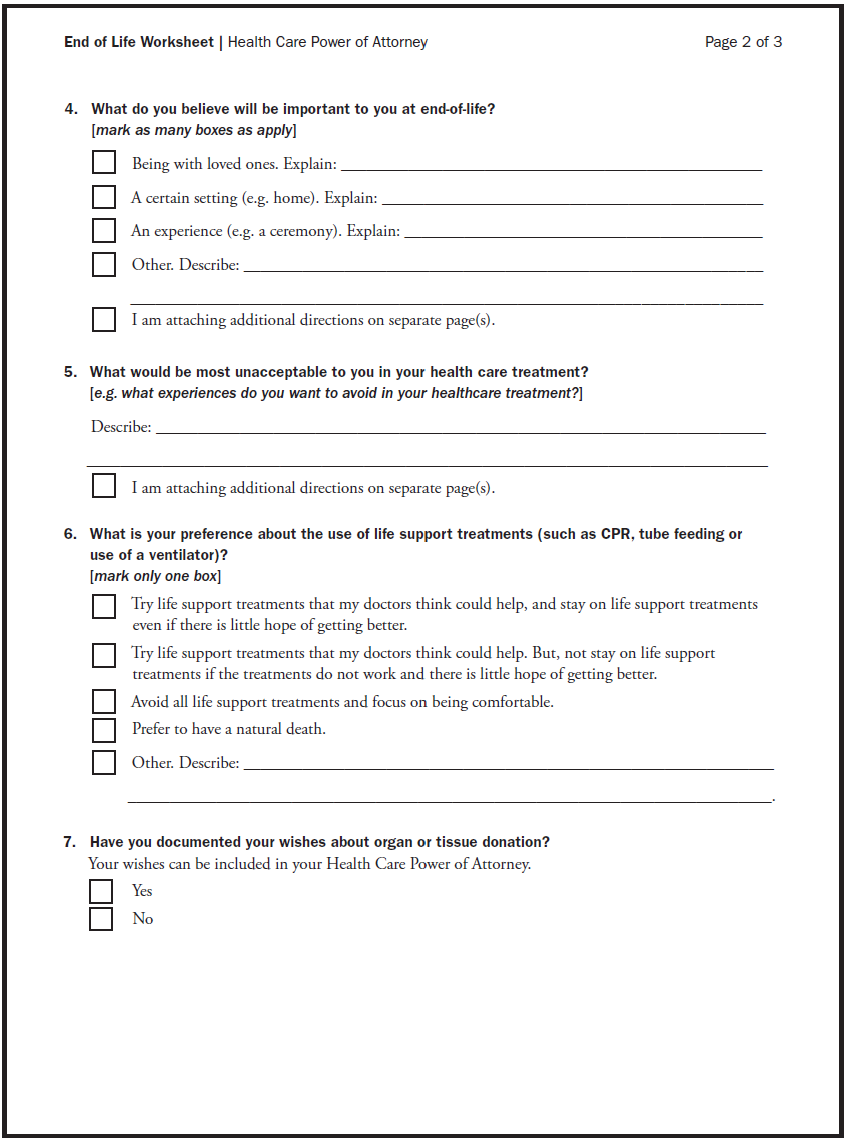
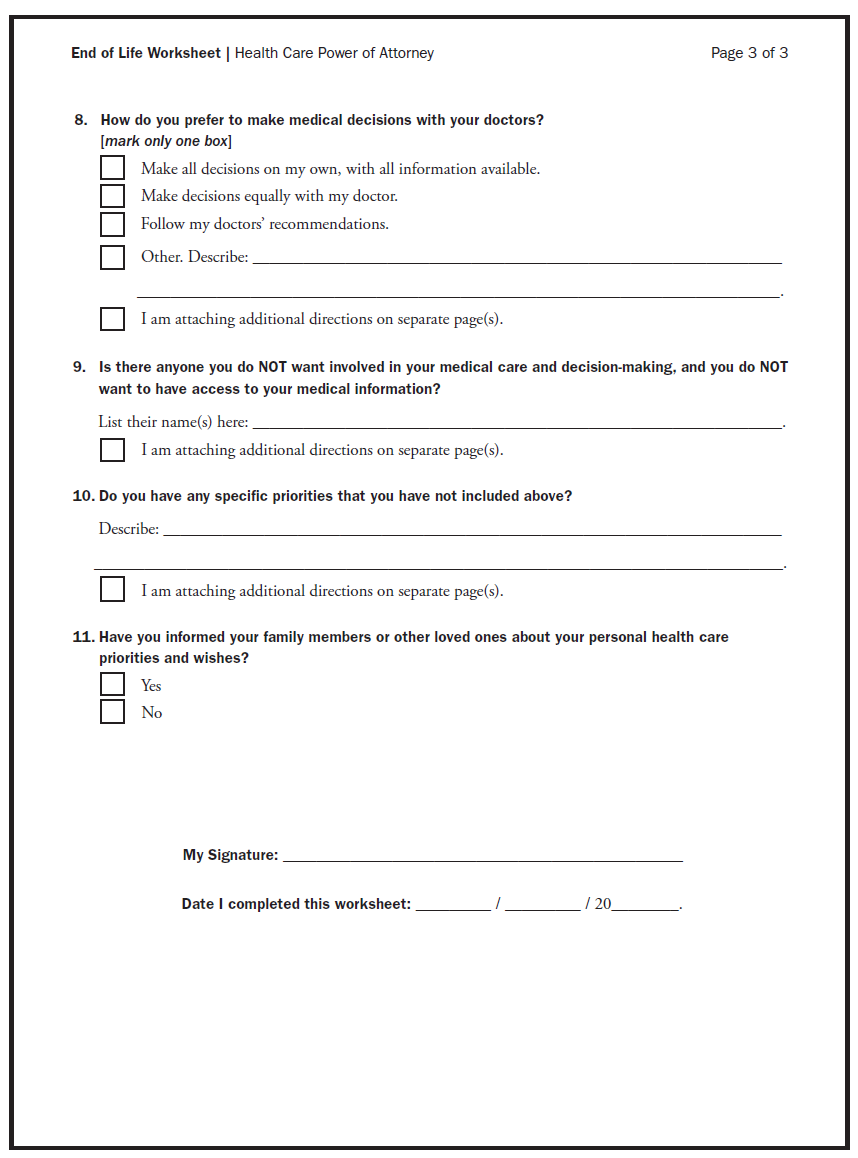
Health Care Power of Attorney Form A

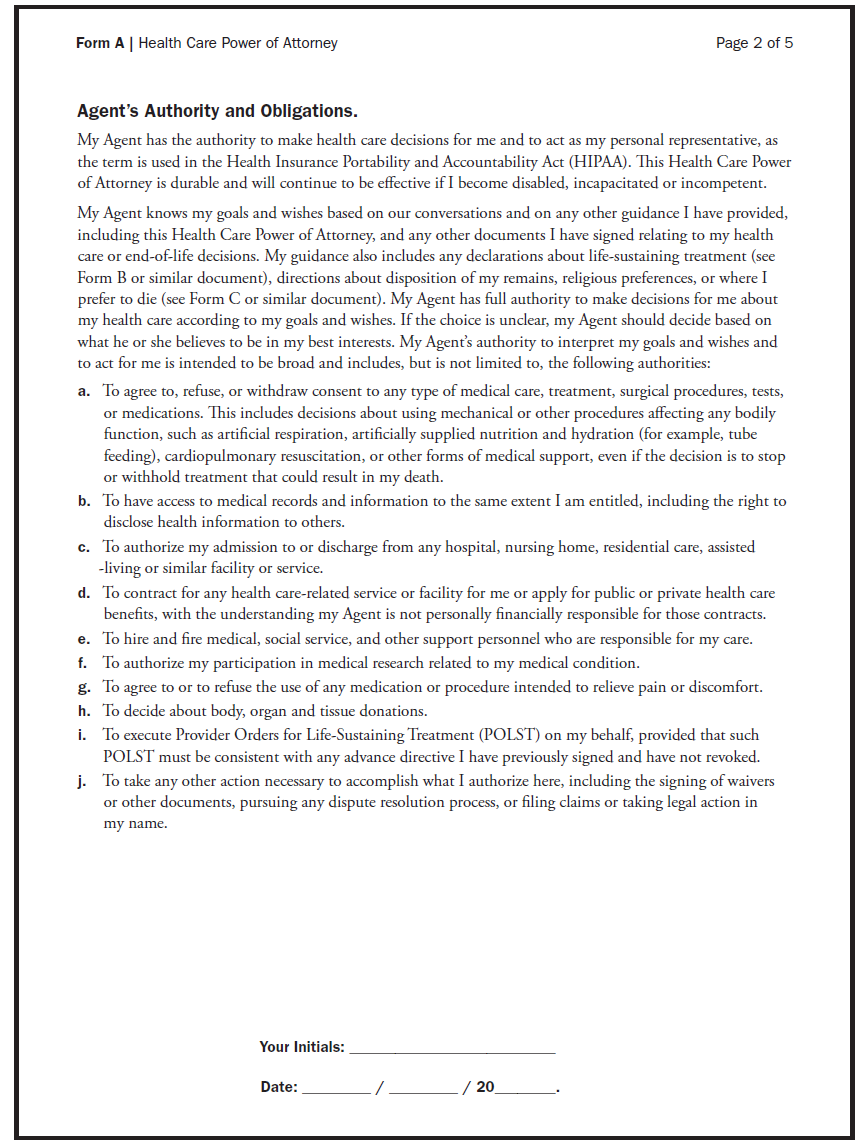
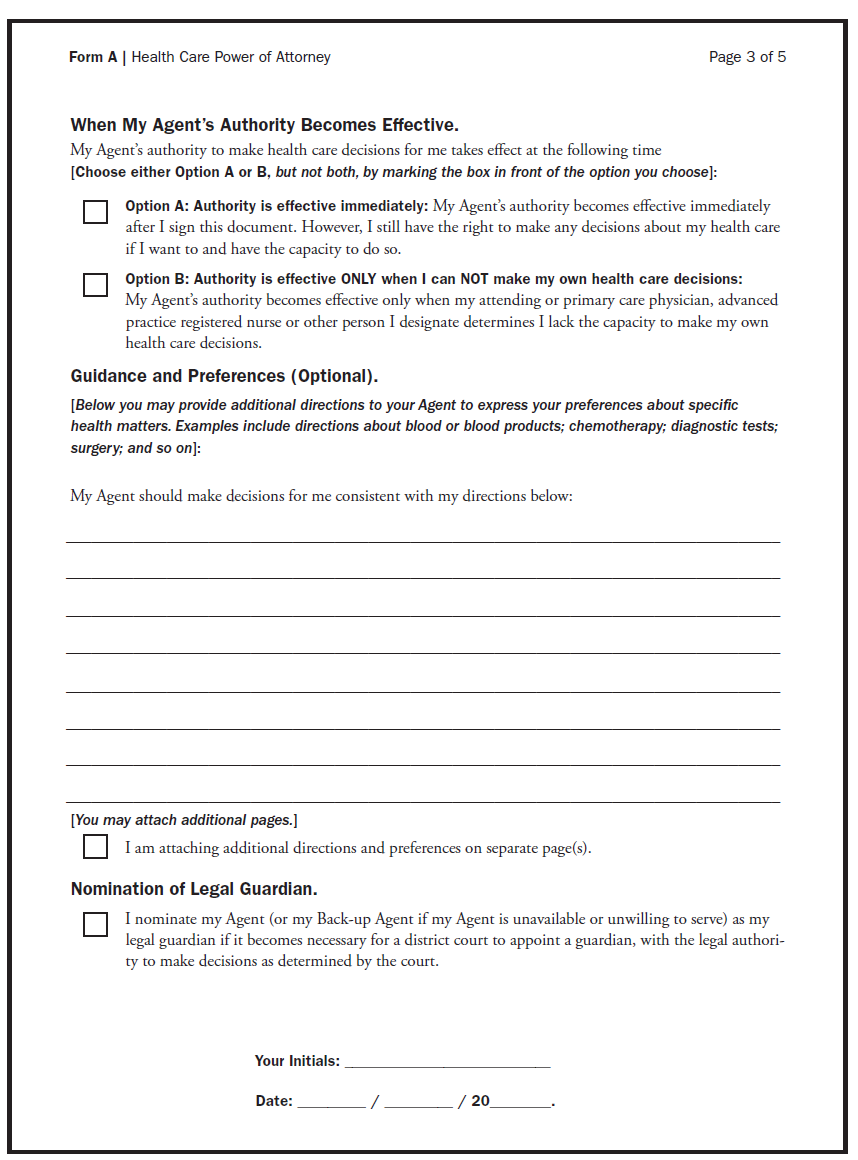
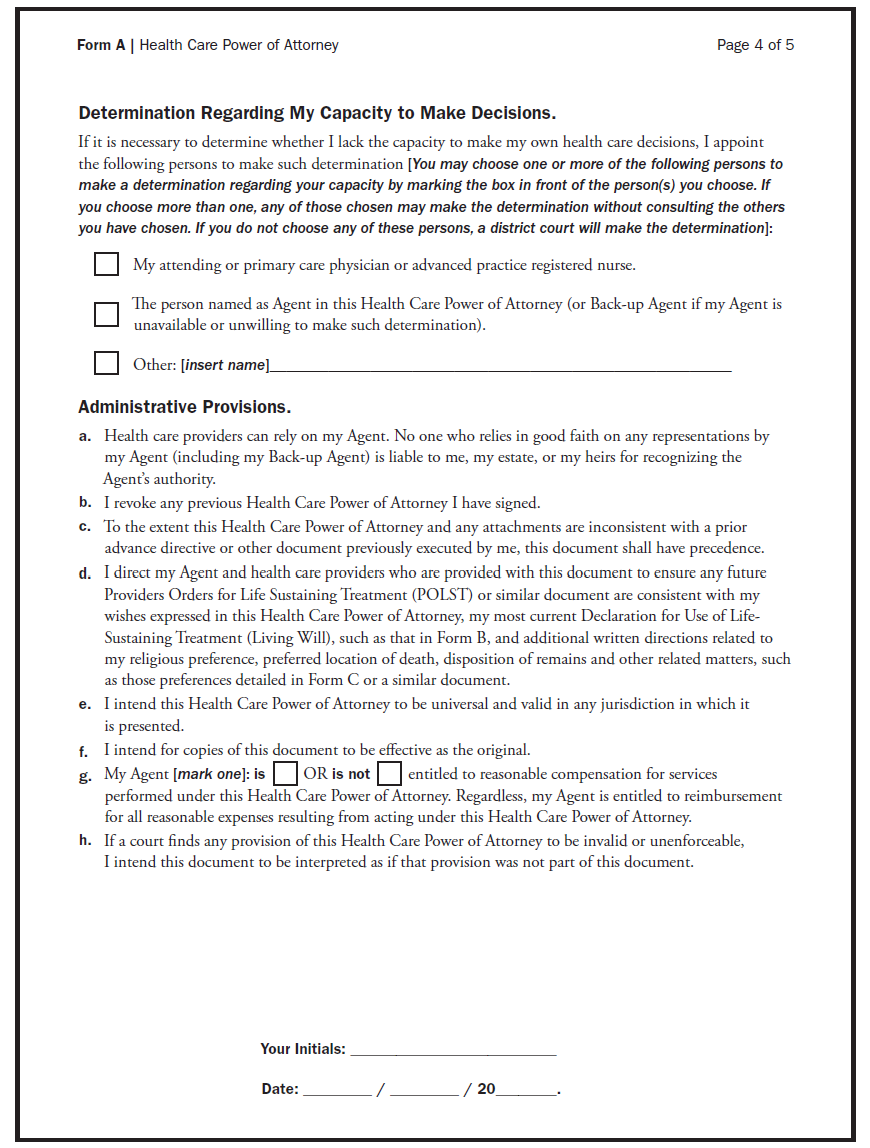
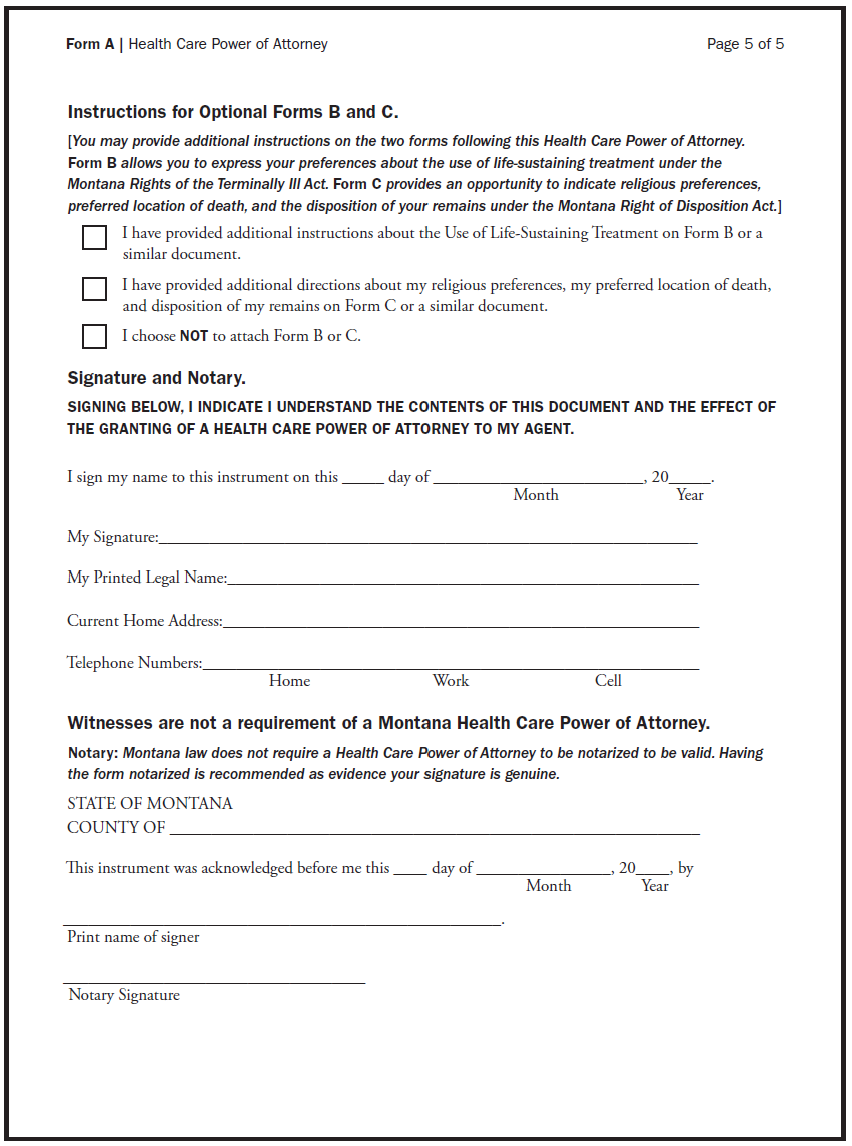
Use of Life-Sustaining Treatment (Declaration) Form B
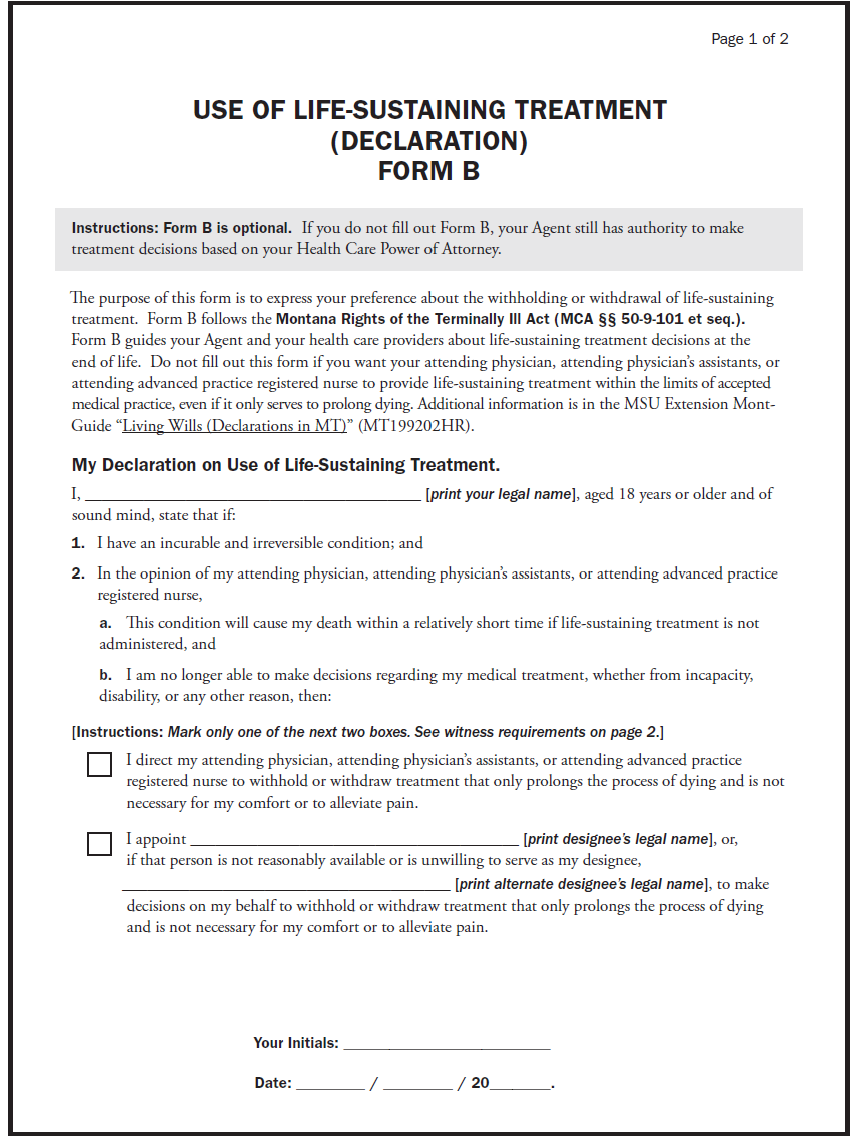
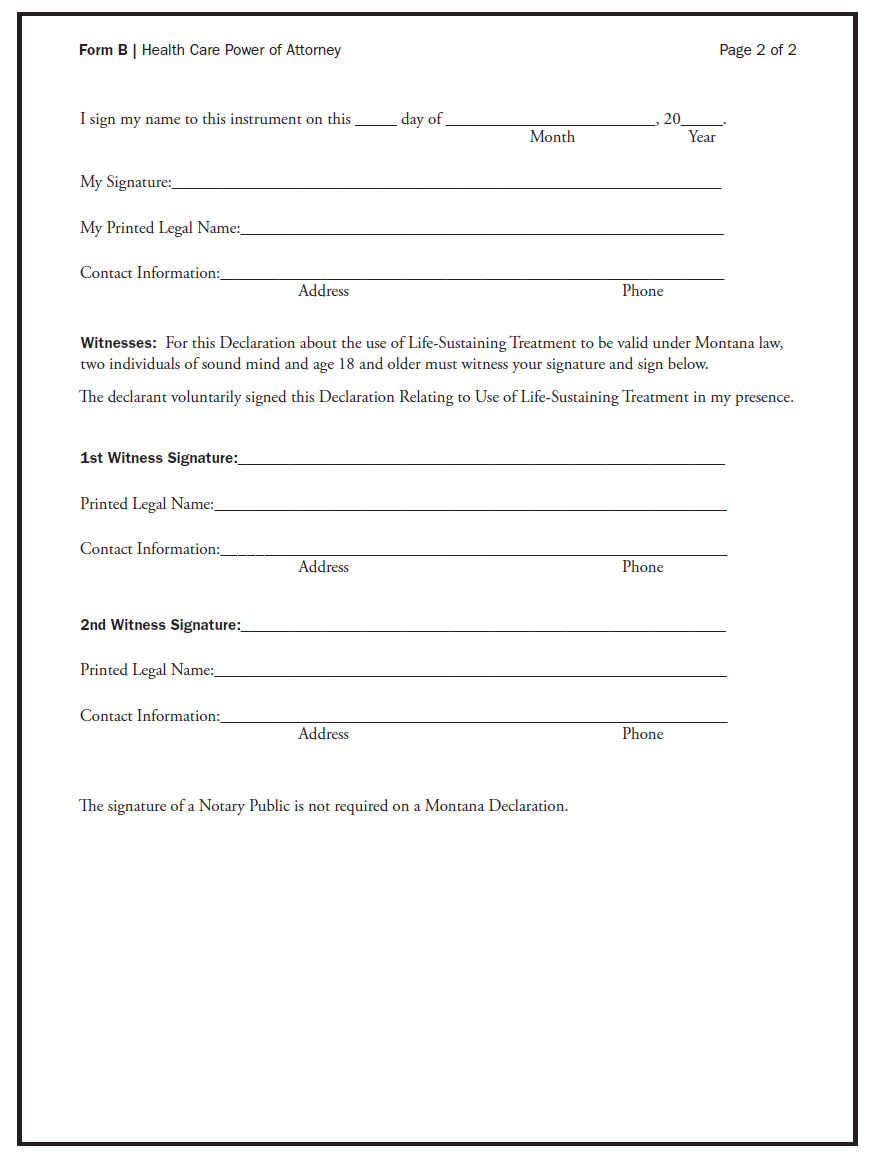
Additional Directions Form C
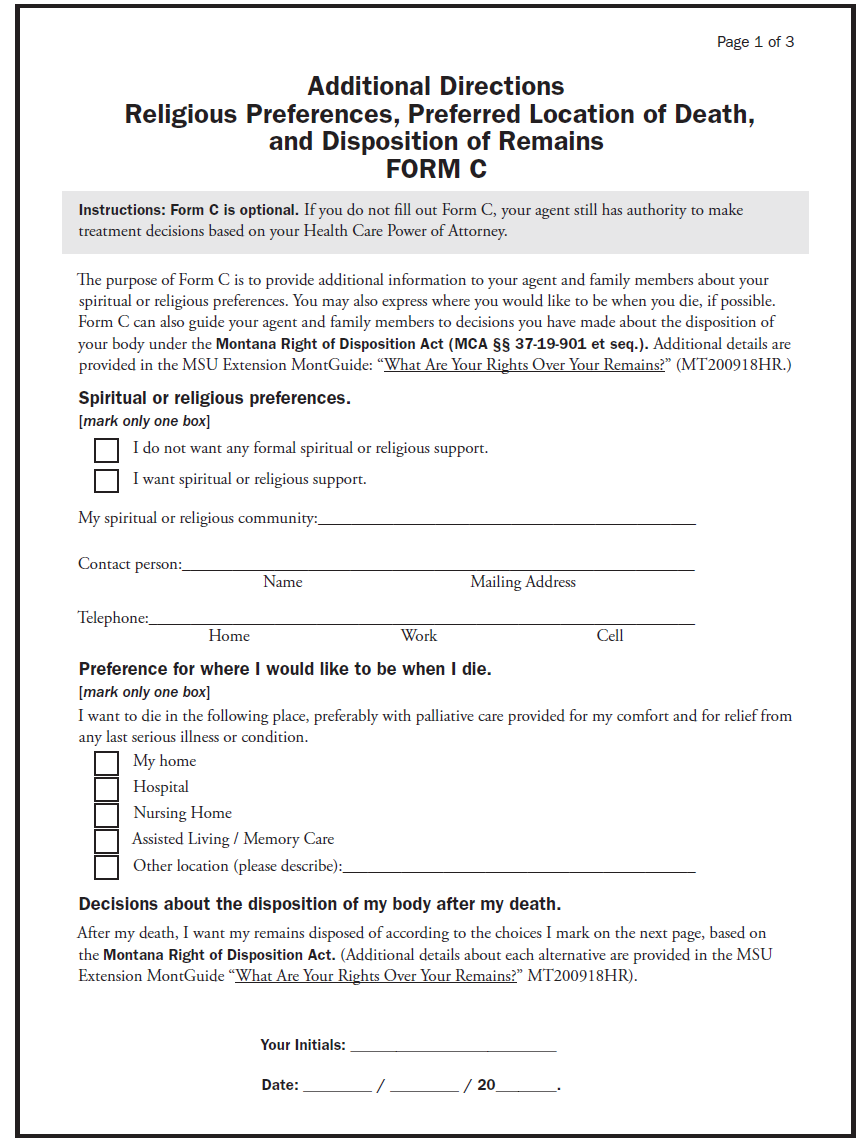
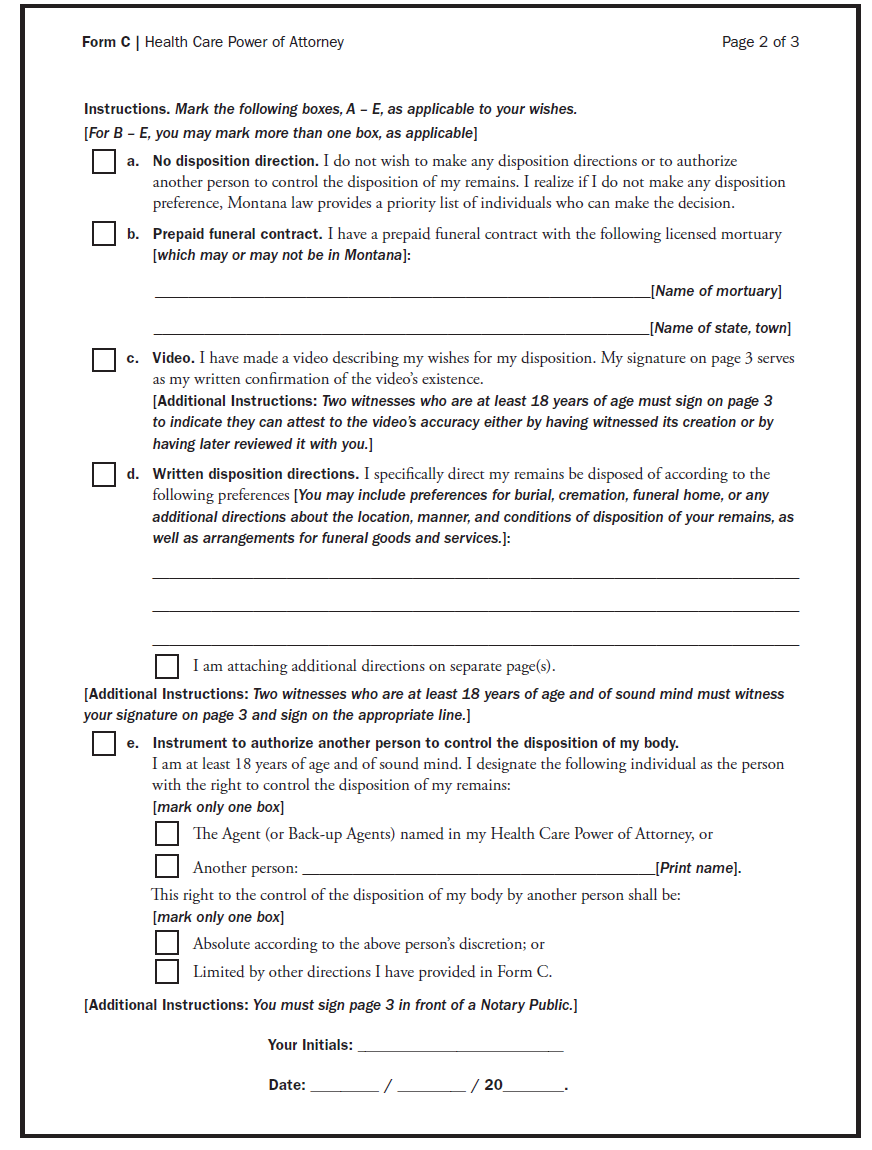
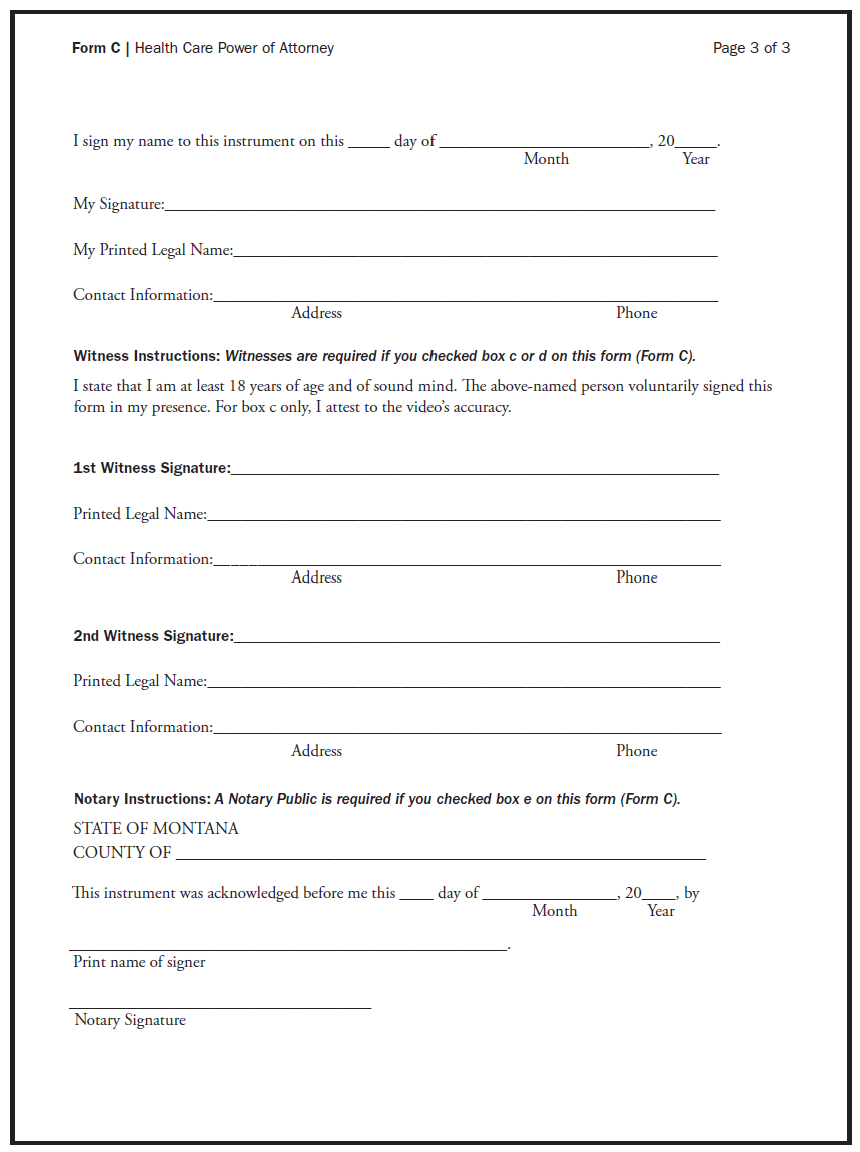
Copyright © 2025 MSU Extension
We encourage the use of this document for nonprofit educational purposes. This document may be reprinted for nonprofit educational purposes if no endorsement of a commercial product, service or company is stated or implied, and if appropriate credit is given to the author and MSU Extension. This publication is available electronically (free) and in hard copy from Montana State University Extension at montana.edu/extension/ and USDA-NRCS Montana at nrcs.usda.gov/montana.
The U.S. Department of Agriculture (USDA), Montana State University and Montana State University Extension prohibit discrimination in all of their programs and activities on the basis of race, color, national origin, gender, religion, age, disability, political beliefs, sexual orientation, and marital and family status. Issued in furtherance of cooperative extension work in agriculture and home economics, acts of May 8 and June 30, 1914, in cooperation with the U.S. Department of Agriculture, Cody Stone, Director of Extension, Montana State University, Bozeman, MT 59717.
